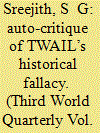| Srl | Item |
| 1 |
ID:
154070


|
|
|
|
|
| Summary/Abstract |
Third World Approaches to International Law (TWAIL) has been impactful in international law scholarship. However, many of its epistemic approaches, especially its active historicising, have often turned counterproductive to its objective of securing freedom for the peoples of the Third World. Moreover, pursuing the colonial past through weighty polemics has rendered TWAIL a discourse that engenders anti-Western sentiments. Further, TWAIL’s dialectic means of resistance and opposition to a past-influenced present ingrained in international law and systems, which are at the disposal of the West, have the reverse effect of dialectically imposing a Western otherness on TWAIL. Hence, an alternative manifesto is sketched, which, while it disagrees with the exclusion of the West in social production, refuses to privilege the West through a Hegelian dialectic of otherness. The alternative manifesto proposes an alternative dialectic wherein the otherness is a ‘universal’ in the self-consciousness of the subjects. It is a dialectic of inclusion and open participation. The article also attempts to situate the new dialectic in international law.
|
|
|
|
|
|
|
|
|
|
|
|
|
|
|
|
| 2 |
ID:
168500


|
|
|
|
|
| Summary/Abstract |
The renaissance of classical realism in International Relations (IR) has highlighted the close historical and conceptual connection between realism and liberalism. In this essay, I consider an underexplored epistemological dimension of this connection using Karl Mannheim’s Ideology and Utopia – an influential work for classical IR realists and an important treatise on political theory in its own right. Based on Mannheim’s argument, I make the case that (a certain kind of) liberalism is the telos of (a certain kind of) realism: that the natural endpoint of the inherent logic of realism is a form of liberalism. I argue that completing the epistemological and political critique that leads to realism by also putting the realist position itself under (self-)examination, unearths a liberal outlook as its foundation. Explicating this dialectic adds a new dimension to the many other points of contact between realism and liberalism that have been explored by IR scholars in recent years, and it provides a new link between this scholarship and the literature on the epistemological foundations of classical realism. Finally, the essay is an argument for a closer engagement with Mannheim in an IR context, both as a philosopher of knowledge and as a political thinker.
|
|
|
|
|
|
|
|
|
|
|
|
|
|
|
|